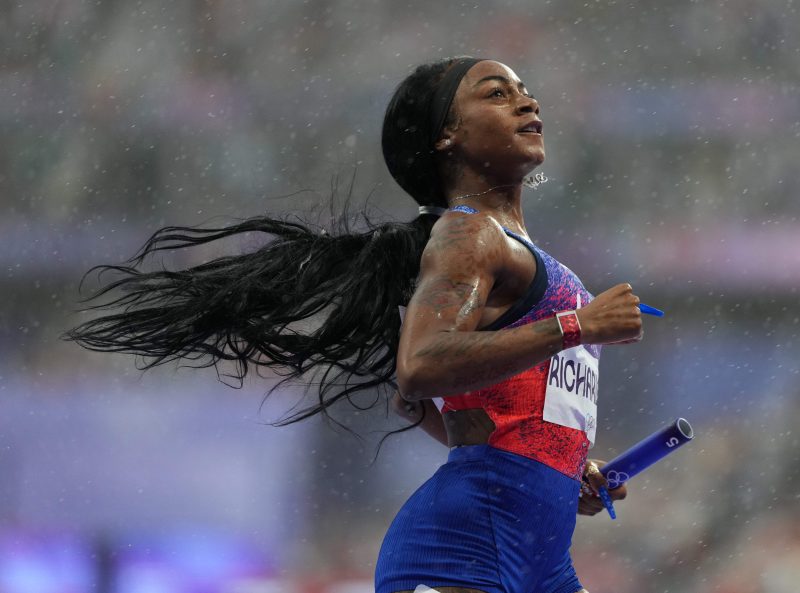SAINT-DENIS, France – Maybe with Sha’Carri Richardson a stare is worth 1,000 words. It better be, because one of the most intriguing Americans of the Paris Olympics didn’t have many more to offer.
You’d think Richardson’s anchor leg in the 4×100 relay that netted a gold medal for Team USA, a 10.09-second sprint to glory, would be one of the great nights of her career, punctuated by an iconic image of the 24-year old turning her head to the right and watching as Great Britain’s Daryll Neita realized she had been passed.
Maybe it isn’t the Olympic moment Richardson envisioned when she came to Paris expecting to win the 100 meters, only to come second against Julien Alfred of St. Lucia. But it’s the one she got.
Was it joy winning her first gold medal? Was it relief? How much pressure did she feel when Gabby Thomas handed her the baton with a couple competitors still to catch? Does she leave Paris viewing her first Olympics as a success, or does it leave her hungry for more?
These are kind of the garden-variety things you’d want to know from someone whose image was omnipresent in television commercials this summer, from one of Team USA’s biggest stars.
2024 Olympic medals: Who is leading the medal count? Follow along as we track the medals for every sport.
Instead, the mystery continues.
“The moment I will describe is that to realize when we won as USA ladies, it was a phenomenal feeling for all of us,” she said. “That’s the answer to your question.”
And that was about it. As the quick interview with the four gold medalists continued, Richardson even moved off to the side, a step behind her teammates, as if she didn’t want to be noticed. For someone as loud and fierce in her style, her fingernails, even her facial expressions on the track, her near-silence seemed like a statement in and of itself.
It’s just hard to figure out exactly what it was.
Richardson will leave Paris having said almost nothing about her performances. When she finished runner-up as the favorite in the 100, she did not stop in the mixed zone where reporters ask questions as athletes come off the field and did not show up at the press conference that is supposed to be compulsory for all three medalists.
Everything was all to the imagination: Was she as nervous as she appeared to be in the moments before the race? Did pressure and anxiety contribute to a poor start out of the blocks that more or less ruined her chances? How did she spend the next few days processing the result? Was her performance in the relay some measure of redemption?
Not every athlete is comfortable in the media spotlight. Fair enough. And Richardson has been through a lot over the last three years ever since the marijuana test that knocked her out of the Tokyo Olympics. Anyone can understand why she might be hesitant to give any more of herself to the public than is required.
But these are legitimate questions, particularly from someone who has made themselves into a vessel for so much conversation both in the pure sporting context and pop culture. In so many ways she’s a great story, but it’s hard to tell when she is so reticent to give even the kind of basic insight into her performances that Americans expect from high schoolers, much less Olympians.
“I just remember trusting my third leg, trusting Gabby, and knowing that she’s going to put that stick in my hand no matter what and to leave my best on the track,” Richardson says.
It went no deeper than that, and it’s a shame because there was obviously so much underneath the surface, so many narratives that you could unpack from a 41.78-second race.
Even for somebody with the highest of expectations, a gold and a silver isn’t a bad haul from your first Olympics. And without Richardson executing a perfect anchor leg, the U.S. wasn’t going to win that gold medal in a race where the handoffs weren’t perfect and her teammates left her with a lot of work to do.
“Obviously passing the baton off to Sha’Carri is a very special and unique thing,” Gabby Thomas said. “She is so fast.”
Maybe Richardson wants us to think it only goes that deep: She’s fast. But one day, we’re probably going to find out what these Olympics were really like for her; what she was feeling knowing that she was among the superstars of these Games, knowing how many more eyeballs were on her because of what happened before Tokyo, understanding that she competes in a discipline where a half-second malfunction can cost you everything.
It’s probably a fascinating story. It’s just one she clearly didn’t want to tell this week.
Instead, we have the stare. Interpret as you wish.
The USA TODAY app gets you to the heart of the news — fast. Download for award-winning coverage, crosswords, audio storytelling, the eNewspaper and more.






